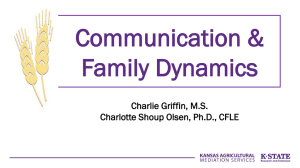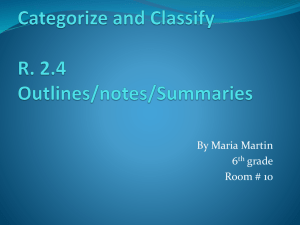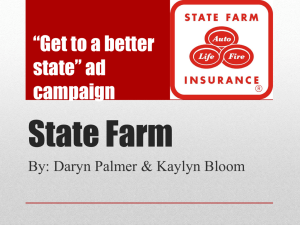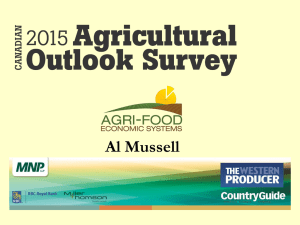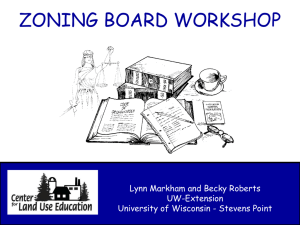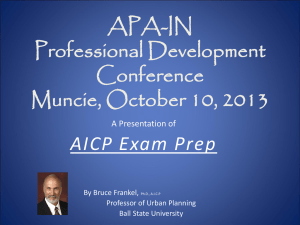When Local Food is Illegal: Keeping Zoning Farm- Friendly
advertisement
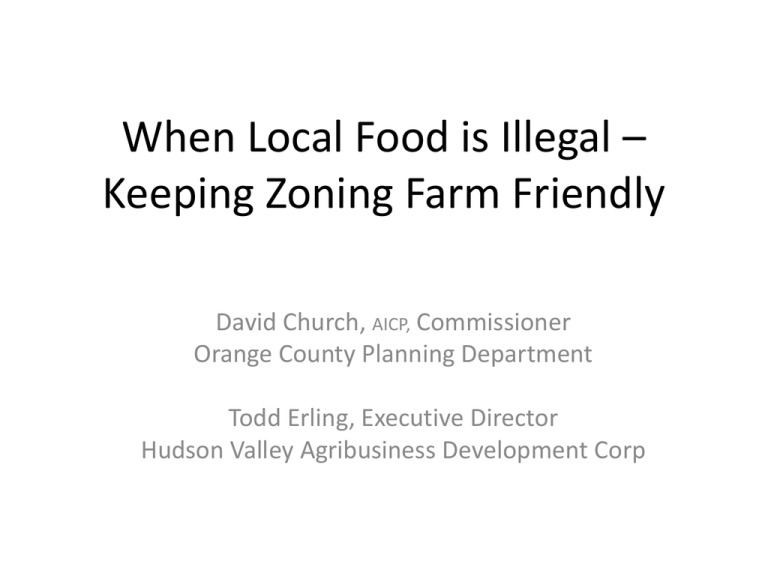
When Local Food is Illegal – Keeping Zoning Farm Friendly David Church, AICP, Commissioner Orange County Planning Department Todd Erling, Executive Director Hudson Valley Agribusiness Development Corp Today’s webinar Overview of Zoning Review of Business Trends & Realities of Contemporary Agriculture Q & A Zoning as a SupportiveTool for Ag Business Q & A 2007 over 8.5 million acres In 53 of 62 counties NOTE: boundary data derived from data available at Cornell’s Mann Library CUGIR site: http://cugir.mannlib.cornell.edu Zoning A Primary – but not the onlyLand Use Management Tool Must be based on a PLAN Must ZONE the whole Municipality Best at managing what you DON’T WANT – a blunt tool for attracting what YOU WANT Conventional v. Performance (a.k.a. form-based or impact based code) Agricultural and Local Planning & Zoning Process • Municipalities responsible for the regulation of land uses through comprehensive/master plans, local zoning, local laws, and building code enforcement. Need local vision - what is the communities desire for the future of agriculture? • Supportive or nonsupportive Farms by Acreage Category # of Farms # of Farmland Acres (1,000) Ag Distilling • Issues with permitting Dairy Processing Washing & Packing Photo credit: Maire Ulrich, CCE Orange Wineries • Retail • Agritourism Zoning & Agriculture First – Farm Friendly Policy The Plan (in NYS legal term is Comprehensive Plan or a supplemental Agriculture and Farmland Protection Plan) Right to Farm Law Audit Existing Codes and Regulations = what codes are old, redundant, too complex, counterproductive? = what are the gaps? A Primary – but not the only- Land Use Management Tool Zoning Basis in Public Health, Safety & Welfare Principles of Equity & Sustainability AML §305-a(1) Policy of Local Governments Imposes affirmative obligation upon local governments to enact and administer local laws and ordinances to effect the policy of AML Article 25-AA, which is to protect and enhance New York’s farmland. AML §305-a(1) Policy of Local Governments …And prohibits local governments from unreasonably restricting or regulating farm operations in agricultural districts unless the locality can show that the public health or safety is threatened. Agriculture & the Comprehensive Plan • Town, Village, County or Regional Comprehensive Plan (content) - may include consideration of agricultural uses [Town Law 272-a(3)(d), Village Law 7-722(3)(d), General Municipal Law 239d(1)(d) and 239-i(1)(d)] • A Town, Village, County or Regional Plan and any amendments shall be subject to the provisions of the ADL relating to enactment and administration of local laws, rules or regulations. [T.L. 279-a(9), V.L. 7-722(9), G.M.L. 239-d(4) & 239-i(4)] Ask yourself the following questions (per NYS Department of Agriculture & Markets) • • • • • • • Do the regulations materially limit the definition of farm operation, farm or agriculture in a way that conflicts with the definition of “farm operation” in AML §301, subd.11? Do the regulations relegate any farm operations in agricultural districts to “nonconforming” status? Is the production, preparation and marketing of any crop, livestock or livestock product as a commercial enterprise materially limited, restricted or prohibited? Are certain classes of agriculture subject to more intensive reviews or permitting requirements than others? For example, is “animal agriculture” treated differently than crop production without demonstrated links to a specific and meaningful public health or safety standard designed to address a real and tangible threat? Are any classes of agricultural activities meeting the definition of “farm operation” subject to special permit, site plan review or other original jurisdiction review standard over and above ministerial review? Are “farm operations” subject to more intensive reviews than non-farm uses in the same zoning district? If the answer to any of the first six questions is “yes problematic and may be in violation of AML §305-a, subd.1 Ask yourself the following questions (per NYS Department of Agriculture & Markets) • Are “farm operations” treated as integrated and interdependent uses, or collections of independent and competing uses on the same property? • Is the regulation in accordance with a comprehensive plan and is such a plan crafted consistent with AML Article 25-AA as required by law? • If the answer to the last two is “no,” the zoning regulations under review are likely to be problematic and may be in violation of AML §305-a, subd.1. Zoning & Agriculture Always Remembering - Public Health, Safety & Welfare + Principles of Equity & Sustainability Next – Definitions of Use - what is agriculture? Zoning Districts - where and when is agriculture allowed? including overlay zones Transfer of Development Rights (TDR) Permitted Uses - what activities are permitted? Standards - the rules for permitted uses dimensions, lot sizes, performance or impact standards …. Counting animals What is a “Farm Operation”? • Defined by AML §301(11) as: “…the land and on-farm buildings, equipment, manure processing and handling facilities, and practices which contribute to the production, preparation and marketing of crops, livestock and livestock products as a commercial enterprise, including a ‘commercial horse boarding operation’ as defined in subdivision thirteen of this section and ‘timber processing’ as defined in subdivision fourteen of this section. For purposes of this section, such farm operation shall also include the production, management and harvesting of ‘farm woodland’, as defined in subdivision three of this section. Such farm operation may consist of one or more parcels of owned or rented land, which parcels may be contiguous or noncontiguous to each other.” Zoning & Agriculture Worth Considering – On Farm v. Off Farm / Farm Support Business business incubator or park Overlay Zoning Districts Transfer of Development Rights (TDR) (see Long Island Pine Barrens) Performance of Impact Based Code Keyed to a conservation plan - Best Management Practices Sound Agricultural Practices Thank You! Contact Info: David Church, AICP, Commissioner Orange County Planning Department 124 Main Street Goshen, NY 10924 845-615-3840 dchurch@orangecountygov.com Todd Erling, Exec. Director Hudson Valley Agribusiness Development Corp 507 Warren St. Hudson, NY 12534 518-432-5360 terling@hvadc.org

